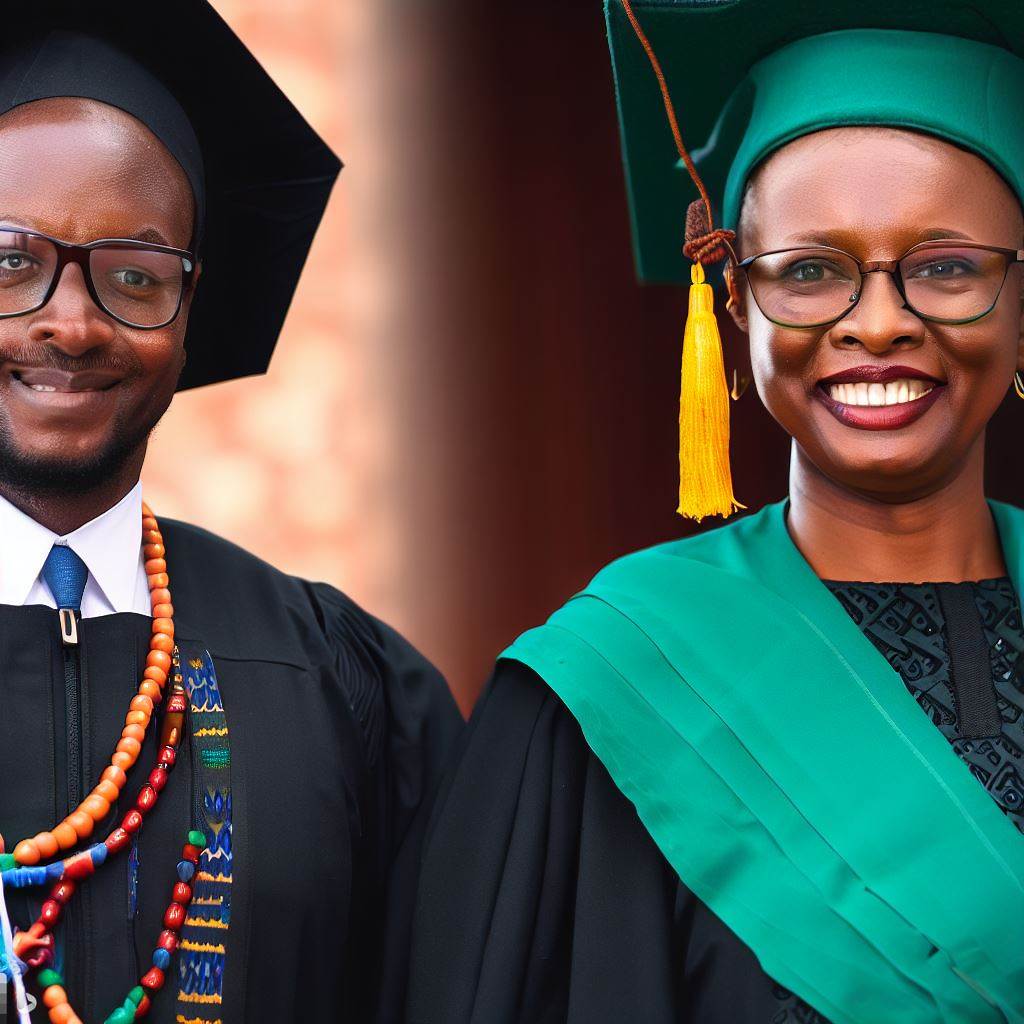Introduction
In Nigeria, cultural influences play a significant role in shaping the behaviors and responsibilities of university professors. Understanding these influences is crucial for effective teaching and mentoring.
University professors in Nigeria are greatly influenced by cultural norms, values, and traditions. These influences impact their teaching methods, communication styles, and approach to academic research.
Understanding cultural influences is vital because it helps in creating an inclusive learning environment that caters to the diverse needs and expectations of students.
It allows professors to adapt their teaching methods and styles to best suit the cultural backgrounds of their students.
These influences also affect the way professors interact with their colleagues and administrators.
Recognizing the cultural dynamics can facilitate effective collaboration, communication, and decision-making processes within the university setting.
Moreover, cultural influences shape the expectations and responsibilities placed upon university professors.
Cultural norms shape perceptions of professors and their roles in academia through respecting elders and hierarchical structures.
By understanding these cultural influences, university professors can better navigate their professional roles, engage in constructive relationships, and contribute meaningfully to the growth and development of higher education in Nigeria.
In the end, cultural influences have a profound impact on the role of university professors in Nigeria.
An understanding of these influences is essential for creating a supportive and inclusive learning environment, fostering effective communication and collaboration, and successfully fulfilling academic responsibilities.
Historical context of Nigerian education system
1. Pre-colonial era
During the pre-colonial era in Nigeria, education was primarily centered around practical skills and cultural values. Local communities provided instruction on various trades, agriculture, and traditional customs.
The role of a university professor, as understood today, did not exist at this time.
2. Colonial era and British influence
With the arrival of British colonial rule, Nigeria’s education system underwent significant changes. The British brought a knowledge-based curriculum to replace the traditional practical focus.
University professors, experts in specific fields, actively share knowledge with students, fulfilling their role as educators.
3. Post-independence and Nigerian cultural resurgence
After gaining independence in 1960, Nigeria experienced a cultural resurgence and a renewed sense of identity.
The education system underwent reforms to reflect the country’s cultural heritage and address its societal needs.
The role of university professors was redefined to include not only imparting knowledge but also nurturing cultural values and fostering societal development.
4. Impact on the role of university professors
The cultural influences on the role of university professors in Nigeria have been profound. Professors are expected to incorporate Nigerian cultural perspectives into their teaching, research, and publications.
They play a vital role in promoting Nigeria’s cultural heritage, addressing national challenges, and contributing to the country’s development.
Key ways cultural influences have impacted the role of university professors
Key ways cultural influences have impacted the role of university professors include:
Research focus
University professors in Nigeria are encouraged to conduct research that addresses local challenges, such as poverty alleviation, healthcare, and sustainable development.
By focusing on these areas, professors contribute directly to the well-being of Nigerian society.
Pedagogical methods
Professors are encouraged to incorporate traditional teaching methods that align with Nigerian cultural values.
These methods may emphasize practical learning, group work, and learning from elders or community leaders.
By using culturally relevant pedagogical approaches, professors enhance students’ understanding and appreciation of their cultural heritage.
Curriculum development
Cultural influences have led to the inclusion of courses and programs focusing on Nigerian history, literature, arts, and indigenous knowledge systems.
This allows students to gain a deeper understanding of their own culture and heritage. University professors play a key role in designing and delivering these culturally relevant courses.
Mentorship and guidance
University professors in Nigeria are not only academic mentors but also cultural guides.
They are expected to provide guidance and support to students, helping them navigate societal challenges and cultural contexts.
Professors play a crucial role in shaping students’ cultural identity and preparing them for active participation in Nigerian society.
In fact, the historical context of the Nigerian education system, from the pre-colonial era to the present, has greatly influenced the role of university professors.
The transition from a practical-based education to a knowledge-based curriculum during the colonial era, followed by a cultural resurgence post-independence, has shaped the expectations and responsibilities placed on professors.
Today, Nigerian university professors are not only educators but also cultural leaders, promoting the country’s cultural heritage and addressing societal challenges through their teaching, research, and mentorship.
Read: Academic Leadership: The Professor as a Role Model in Nigeria
The Nigerian cultural landscape
When discussing the role of university professors in Nigeria, it is essential to consider the cultural influences that shape their responsibilities and interactions.
The Nigerian cultural landscape is diverse and vibrant, which greatly impacts academia. The following factors play a significant role in shaping the role of university professors:
Nigeria is a country rich in cultural diversity, with over 250 ethnic groups. Each ethnic group has unique cultural practices, languages, and beliefs.
This diversity makes the Nigerian cultural landscape a complex and dynamic environment for university professors.
1. Ethnic Diversity and its Influence on Academia
In Nigeria, ethnic diversity strongly influences academia, including the role of university professors.
Professors are often expected to understand and respect the cultural backgrounds and traditions of their students.
This implies that to be effective educators, professors must accommodate different perspectives and foster inclusivity.
2. Cultural Values and their Impact on the Role of Professors
Nigerian cultural values greatly shape the role of university professors. Respect for elders and authority, for example, is highly regarded.
This influences the kind of relationship students and colleagues have with professors, often characterized by deference and formal interactions.
3. Gender Dynamics in Nigerian Academia
Gender dynamics significantly impact the role of professors in Nigeria. Historically, there has been a gender imbalance, with fewer women occupying top academic positions.
However, efforts are being made to address this disparity and promote gender equity in the sector.
Considering these cultural influences, it becomes clear that the role of university professors in Nigeria extends beyond teaching and research.
In essence, the cultural influences on the role of university professors in Nigeria are diverse and multi-faceted.
Ethnic diversity, cultural values, and gender dynamics all play a crucial role in shaping the responsibilities and interactions of professors.
Embracing these influences and striving for inclusivity will contribute to a thriving academic environment in Nigeria.
Read: Exploring Interdisciplinary Studies: A Guide for Nigerian Professors
Traditional expectations of university professors
Role as scholars and knowledge holders
In Nigeria, university professors are expected to uphold traditional values and norms. They are seen as scholars who possess extensive knowledge in their respective fields.
Moreover, professors also have the responsibility of fostering critical thinking and intellectual curiosity among their students.
They encourage students to question and analyze societal norms and cultural practices, while still ensuring that the essence of Nigerian culture is preserved.
By promoting dialogue and understanding, professors contribute to the overall growth and development of Nigerian society.
In addition to their roles as scholars and knowledge holders, university professors in Nigeria are expected to contribute to academic research and advancement.
They are actively involved in publishing papers, conducting research, and presenting their work at conferences.
This commitment not only enhances their own academic profile but also contributes to the overall academic standing of Nigerian universities.
Respect and authority within the academic community
Professors hold a position of respect and authority within the academic community in Nigeria. They have the responsibility to transmit Nigerian cultural heritage to their students.
Traditional expectations of university professors in Nigeria are deeply rooted in the country’s cultural values and norms.
In Nigerian culture, elders are revered for their wisdom and experience, and this reverence extends to university professors.
They are seen as role models and hold a position of authority within the academic community.
Professors are respected not only for their academic achievements but also for their ability to embody and represent Nigerian cultural values.
Transmission of Nigerian cultural heritage
As scholars and knowledge holders, these professors are expected to embody and pass on the traditional wisdom and knowledge to the younger generation.
One of the key roles of university professors in Nigeria is to transmit Nigerian cultural heritage to their students. Nigerian culture is rich and diverse, with various traditions, customs, and beliefs.
Professors play a crucial role in teaching and preserving this cultural heritage by incorporating it into their teaching methods and curriculum.
Through their lectures, discussions, and research, professors ensure that students understand and appreciate their cultural roots.
Another aspect of the traditional expectations of university professors in Nigeria is their involvement in community service.
Professors often engage in outreach programs, consulting for government agencies, and providing expertise to local communities.
This interaction helps to bridge the gap between academia and society, allowing knowledge and expertise to be shared and applied for the greater good.
In review, cultural influences play a significant role in shaping the expectations and responsibilities of university professors in Nigeria.
As scholars and knowledge holders, they are expected to uphold and transmit Nigerian cultural heritage.
Their role as educators extends beyond the mere transmission of knowledge, encompassing the fostering of critical thinking, community service, and academic research.
University professors in Nigeria are respected and hold authority within the academic community, embodying the traditional values and norms of the country.
Read: The Impact of Technology on University Professorship in Nigeria

Western influence on the role of university professors in Nigeria
Western educational models
- Nigeria’s education system was influenced by the British colonial masters.
- Western models brought about a traditional lecture-based teaching approach.
- Professors were seen as authoritative figures, delivering knowledge to passive students.
Shift towards research and publication
- The Western influence introduced a focus on research and academic publications.
- Professors were expected to engage in research activities to contribute to academic knowledge.
- Publications in reputable journals became a benchmark for academic success.
Impact of globalization on academic standards and expectations
- Globalization has increased the expectations for Nigerian professors to meet international standards.
- Professors are now evaluated based on their international collaborations and research contributions.
- Dual roles as scholars and mentors have become more prominent, shaping the role of professors.
- Professors are expected to provide guidance and mentorship to students beyond traditional teaching.
In a nutshell, the Western influence on the role of university professors in Nigeria has brought about significant changes.
The introduction of Western educational models led to a lecture-based approach and the perception of professors as authorities.
However, there has been a shift towards a focus on research and publications, placing increased importance on academic contributions.
Globalization has further influenced academic standards and expectations, emphasizing international collaborations and mentorship roles.
These factors have transformed the role of university professors in Nigeria, shaping them into not only teachers but also scholars and mentors.
Read: The Future of University Professorship in Nigeria: Trends to Watch
Challenges faced by Nigerian university professors
In Nigeria’s culture and under Western influences, university professors encounter culture-driven challenges, shaped by various factors.
These challenges can hinder the effectiveness and overall role of professors within Nigerian universities.
In this blog section, I will explore the challenges faced by Nigerian university professors, including balancing cultural expectations and Western influences, limited resources and funding, and administrative and bureaucratic obstacles.
1. Balancing Cultural Expectations and Western Influences
Nigerian university professors often find themselves caught between cultural expectations and Western influences. Traditional Nigerian culture places high value on authority and respect for elders.
However, Western influences emphasize critical thinking, independence, and questioning authority.
This creates a delicate balance for professors, as they strive to meet both cultural expectations and enable students to think critically and challenge existing knowledge.
Publish Your Professional Profile, Business or Brand
Showcase your expertise, gain trust, and boost visibility instantly on Professions.ng.
Publish Now2. Limited Resources and Funding
Another significant challenge faced by Nigerian university professors is the lack of resources and funding.
This constraint affects various aspects of their role, including research, teaching materials, and infrastructure.
Insufficient funding hinders professors’ ability to conduct high-quality research and obtain necessary equipment, limiting their contribution to knowledge development and innovation.
Additionally, inadequate resources make it difficult for professors to provide students with up-to-date and comprehensive educational materials, compromising the quality of education.
3. Administrative and Bureaucratic Obstacles
Nigerian university professors encounter administrative and bureaucratic obstacles that impede their effectiveness in fulfilling their role.
Excessive bureaucracy and red tape often slow down decision-making processes, hinder academic initiatives, and restrict professors’ autonomy.
Moreover, administrative duties consume research and teaching time, inducing frustration and impeding overall productivity improvement.
Addressing these challenges
To address these challenges and ensure the effective role of university professors in Nigeria, certain steps can be taken:
Promoting a Balanced Approach
Nigerian universities should seek a balance between cultural expectations and Western influences.
By integrating critical thinking and independent inquiry into the curriculum while respecting cultural traditions, professors can better prepare students for the demands of a globalized world.
Increased Funding and Resource Allocation
The Nigerian government and university management should prioritize funding for research, teaching materials, and infrastructure improvements.
Adequate resources would equip professors with the necessary tools to enhance the quality of their research and teaching, ultimately benefiting students and the academic community as a whole.
Streamlining Administrative Processes
Simplifying administrative procedures and reducing bureaucratic obstacles would enable professors to focus more on their primary responsibilities.
By delegating administrative tasks to dedicated staff and implementing efficient systems, professors can have more time and energy for research, teaching, and mentoring.
In general, Nigerian university professors face several challenges that can hinder their effectiveness and role within the academic landscape.
Balancing cultural expectations and Western influences, limited resources and funding, and administrative and bureaucratic obstacles all contribute to these challenges.
Promoting balance, allocating funds, and streamlining processes can elevate Nigerian professors’ role, fostering knowledge creation and student growth.
Read: A Comprehensive Overview of Special Education in Nigeria
Strategies for addressing cultural influences on the role of university professors
- Developing cultural sensitivity training programs to educate professors on diverse perspectives.
- Implementing policies that promote equal opportunities for professors from different cultural backgrounds.
- Establishing mentorship programs to support professors in navigating cultural challenges.
- Creating platforms for open dialogue and collaboration among professors from diverse cultural backgrounds.
- Incorporating cultural competence into the academic curriculum to foster understanding and respect.
Promoting cultural diversity and inclusivity in academia
- Encouraging the hiring of professors from diverse cultural backgrounds to enhance representation.
- Creating safe spaces for students and professors to express their cultural identities without prejudice.
- Organizing cultural events, workshops, and seminars to celebrate diverse cultures within academia.
- Supporting student organizations that promote inclusivity and cultural awareness on campus.
- Offering scholarships and financial aid opportunities to students from underrepresented cultural backgrounds.
Building bridges between traditional and Western approaches
- Promoting interdisciplinary research that combines traditional and Western knowledge systems.
- Encouraging collaboration between professors specializing in traditional and Western academic disciplines.
- Creating platforms for the exchange of ideas and methodologies between traditional and Western scholars.
- Developing joint research projects and partnerships between Nigerian universities and Western institutions.
- Providing resources and support for professors to incorporate traditional knowledge into their teaching and research.
Encouraging research on Nigerian cultural contributions in academia
- Establishing research grants and funding opportunities specifically dedicated to Nigerian cultural studies.
- Recognizing and promoting academic publications that highlight Nigerian cultural contributions.
- Organizing conferences and symposiums focused on showcasing research on Nigerian culture.
- Encouraging professors and students to explore Nigerian cultural topics in their research projects.
- Collaborating with cultural institutions and organizations to document and preserve Nigerian cultural heritage.
All in all, addressing cultural influences on the role of university professors in Nigeria requires a multi-faceted approach.
Strategies such as cultural sensitivity training, promoting diversity and inclusion, bridging traditional and Western approaches, and encouraging research on Nigerian cultural contributions can contribute to a more inclusive and culturally aware academic environment.
By implementing these strategies, Nigerian universities can foster a supportive and enriching cultural experience for both professors and students.
Read: Insights into the Teaching Profession in Nigeria Today
Conclusion
The main points discussed in this chapter include the influence of culture on the role of university professors in Nigeria, the importance of recognizing and understanding these influences, and the need for further research and conversation on this topic.
Recap of the main points discussed
Throughout this post, we have explored the cultural influences on the role of university professors in Nigeria.
We have seen that cultural factors such as social hierarchies, gender norms, and traditional values shape their roles and responsibilities.
Importance of recognizing and understanding cultural influences
Recognizing and understanding these cultural influences is crucial for a better understanding of the challenges and opportunities that university professors in Nigeria face.
By acknowledging the impact of culture, we can develop strategies and interventions that address the unique needs of these professionals.
Call for further research and conversation
This post serves as a starting point for further research and conversation on the topic.
Future studies should delve deeper into the specific cultural factors that influence the role of university professors in Nigeria and explore ways to promote inclusive and culturally responsive practices in higher education.
By focusing on the cultural influences on university professors in Nigeria, we can foster a more inclusive and effective higher education system that supports the growth and development of both students and educators.
It is imperative that we continue the conversation and invest in further research to fully understand and address these influences.




